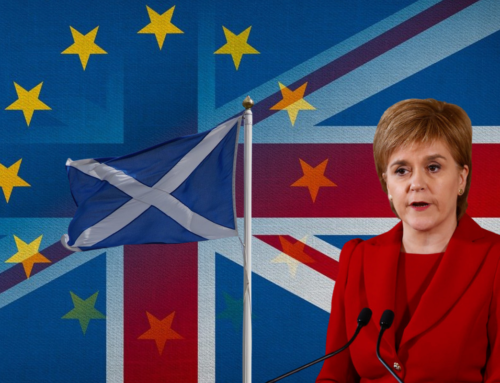Our Greatness Lies in Staying in Not Pulling out
 By Ira Straus, U.S. Coordinator of the Committee on Eastern Europe and Russia in NATO, an independent policy analysis organization; and Chair of the Center for War/Peace Studies
By Ira Straus, U.S. Coordinator of the Committee on Eastern Europe and Russia in NATO, an independent policy analysis organization; and Chair of the Center for War/Peace Studies
Americans and Britons have a common interest in avoiding Brexit. I hope it will not be taken amiss if, as an overseas citizen of the Anglo-American world, I discuss why Americans see it that way. People around the world comment all the time on how Americans ought to vote, and we mostly take it for granted. In the days of the Empire, Brits took it for granted, too. My appeal is to that spirit, not least because I wish to discuss the matter from the vantage point of our common history and the vast inheritance we have jointly build over the centuries.
I do not wish to focus on the specific dangers that Brexit would pose to American and British interests—more instability in trade and finance; a less Atlantic-oriented EU; renewed threat of Scottish secession; troubles for NATO…. The former NATO Secretaries-General were well-founded in their warning about Brexit’s consequences; which is why they all joined in issuing it.Nor would I focus on the benefits that Brexit proponents hope for, implausible though they mostly seem to me.Would that it were really true, that one could make more of the US-UK relationship after a Brexit! But Britain had already taken the special relationship as far as it could go long before it joined the EC/EU. We had a century after 1865 to build the special relationship, and it had reached its main limits already by 1900. America felt it would traduce its identity, derived from 1776, were it to reunite with Britain alone. That was the brick wall intowhich further progress on that level ran. It was only by adding in third countries on the Continent, in the wider Euro-Atlantic alliances after 1914and in the Euro-Atlantic institutional system after 1947, that it proved possible to deepen the Anglo-American relation. And that is just what Brexit would harm, sending Anglo-American relations backwards not forward.
All these specifics are perhaps in a sense “adjustment costs”. There are always heavy adjustment costs from divorces. That’s why the starting assumption is always, rightly, against divorce, in the absence of a compelling cause.
So it is high time that, on the Stay side not just the Leave side, we look beyond these specific costs to the larger issue: who we Anglo-Americans are, and what we would turn ourselves into if we dismantled, in whole or in part, the Euro-Atlantic system at whose core we stand. It is this question that makes me feel it is not only within my rights to comment on Brexit; it is a kind of duty, as a member of the Anglo-American world.
The English-speaking peoples have had two great international imperatives in the course of their history: first freedom through separation, then leadership of freedom through integration. Separation is emphasized, in truth overemphasized, in our popular recollections of our history, as it comes earlier, at the moments of our heroic battles of identity-formation. But leadership has become our actual imperative in a world where we are no longer a beleaguered fringe but the very core of the world order.
What made separateness such a strong imperative for us in early modern times? It was the fact that we developed modern liberty faster than the rest of the European world, apart from minor exceptions such as the Netherlands. (To be sure, it was an imperative that many Brits thought we Americans carried too far even then, when we used it to break apart the British Empire in 1776.)
Things have changed since then. Liberal democracy has gradually spread across Europe and made inroads around the world. And the Anglo-American world has grown from a periphery of European power to the center of European and global power.The new imperative was leadership. It was understood slowly. Over the course of a long bitter century, we shifted our premises from separatism to integration.
Britain and Greater Britain, and the Euro-Atlantic System
“If two small islands are by courtesy styled ‘Great’,” — so wrote Sir Charles Dilke in 1868 – “America, Australia, India, must form a Greater Britain.” And the Greater Britain, held Dilke, was the seat of England’s future greatness: “Britain in her age will claim the glory of having planted greater Englands across the seas.”
Where is the Greater Britain today? It has morphed into a Euro-Atlantic system. It is an evolution that sounds strange, as the name has changed completely; yet the historical missing links are there, and cultural anthropologists can trace how it happened. And it has on balance grown further in the process. Despite losing its colonies, it has gained additional major industrial democracies as an organic part of its system. Its neighbors, who always shared much of its heritage, joined it in its liberal democracy, and these democracies were gathered together into an organized confederacy around the Anglo-American core of Greater Britain.
This is the key consideration for understanding what makes us unique and “great”. It is not that we are the most perfect liberal democracies in the world; by now that way of government has spread to many countries, and debates on which is most advanced are petty. Rather, it is that we are font and leaderof all the advanced liberal democracies. We have organized them into a cohesive grouping. It is by far the largest and strongest cohesive grouping in the world; its extent is made manifest in OECD with over 60% of the world economy and an even greater share of global military power. The organized unity of this democratic grouping is what makes it in turn the core power of the world order: the point of referencefor its functioning and the anchor of its stability.
The old Greater Britain was the ballast that enabled the Pax Britannica to endure a century. The new Greater Britain – – which is also a Greater America and a Greater Europe – – is the cornerstone of the world order of today.
Just as surely as England’s future in 1868 lay in the Greater Britain of Dilke’s time, so today England’s future lies in its role in the remodeled Greater Britain of the Euro-Atlantic world.
England continues to play a pivotal role in maintaining the cohesion of this complex Euro-Atlantic union, even as the organizing power centerfor it has shifted west to America. With its dual roles in the EU and the Atlantic, Britain has a unique role in holding together the system, in half-forgotten yet fundamental places withinits architecture. It is like the eccentric pipe that spanned a medieval cathedral; a modern redecorator thought it senseless and had it torn out, and the whole edificecame tumbling down. The Euro-Atlantic system is jerry-rigged like a split-level home. This is its strength and its weakness. Its multiple levels build on the reality of different degrees of unity possible on the different levels: a solid NATO provides the common security orientation that underpins the unity of the EU; a solid EU fills in for NATO in the vast policy spheres where America is not willing to pool sovereignty; and both underpin the UN. But it also confuses the shared identity, already weak compared to ancient national identities, and addsintertwined complexities and fragilities. It needs special bonds to connect the levels more securely than the formal structure would show.Fortunately there is a special binding country: Britain. It is the kind of eccentric link that the contemporary redecorators should not underestimate.
Withdrawing the British pillar by way of a Brexit would be akin to pulling the plug on the system. No one can foretell how far the unravelling would go. Would it stop at “merely” a contagion of exits from an EU that is already at the brink? Or at Scotland finally going ahead with pulling out of Great Britain, reducing it to the ancient inner Britain? Or America electing Trump and, in keeping with the Brexit spirit of the times, pulling out of NATO? No one knows. The far-fetched can become surprisingly near, when international systems go into a tailspin.This is what is meant when it is said, in diplomatic parlance, that the consequences of a Brexit would be “unpredictable”.
Staying the course, in Europe and the Atlantic together, is the means of maintaining what has been achieved in all the centuries of Great Britain and Greater Britain. It sustains unbroken the thread of our history — along thread of progress, with glories in our past, and a privilege almost unique among nations of cumulatively adding onto them to shape the future. It is not just the better angel of our natures; it is the prouder angel of our natures.






